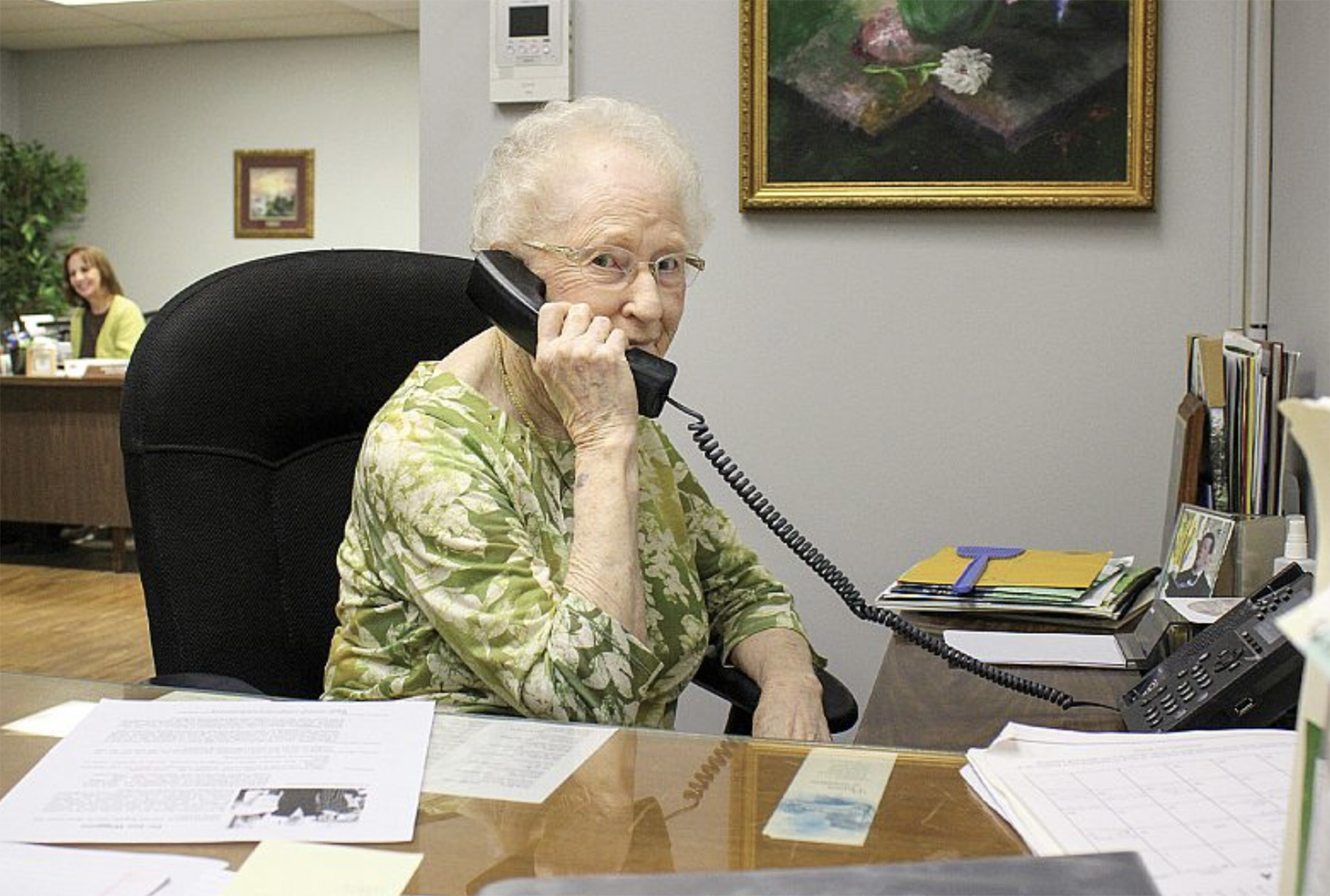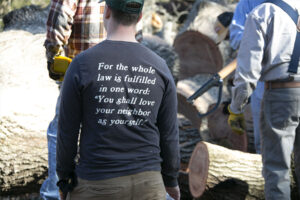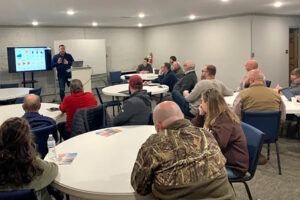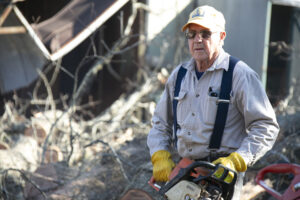By Kim Henderson
WORLD News Group
Sue Nell McMillan was barely 28 when First Church, Mendenhall, hired her as church secretary in 1962. John F. Kennedy was president, and the Beatles had just released their first single. McMillan is now 90. She never married, never moved from her hometown, and never considered a career change. She never talks about retiring, either, even after 62 years in the same position.
McMillan has spent a good part of her life on the telephone, applying the cohesive power of a landline to the bonds of church membership. It’s hard to guess how many times she has answered “First Baptist Church” into a corded mouthpiece. Her deft replies would be hard to number, too. Choir practice starts at 4. No funeral arrangements yet. Of course, the pastor would be happy to meet with you.
Her six-decade tenure is remarkable, especially in light of the job description. Church secretaries are a unique sort of first responders. They get the notices of illness and announcements of death. They know the sorrows, the family struggles, the personal sins. To be a church secretary — a good one — takes an incredible amount of godly wisdom and discretion.
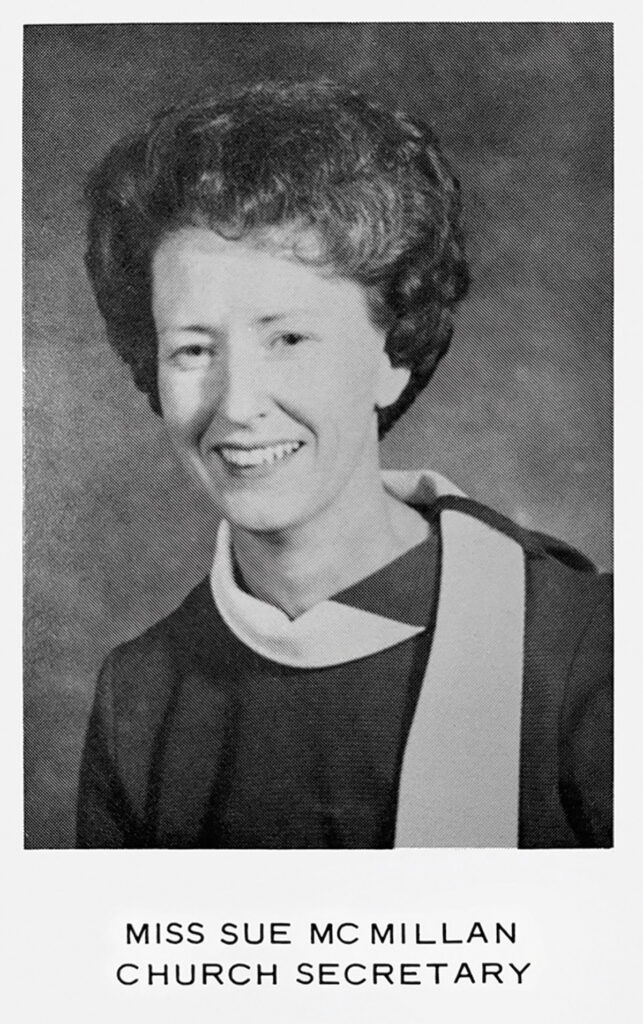
McMillan waves away such talk. Anchored by sensible shoes and a Depression-era upbringing, she maintains holding things in confidence just comes easy for a woman who’s naturally quiet. Still, McMillan knows she represents the old guard of church secretaries. Her younger counterparts even go by a new title.
“They’re ‘ministry assistants’ or something, which is all right,” she says, adding that she tries to keep the ministerial aspect in mind as she works. Because what she does is indeed ministry, especially to the person on the other end of the phone. “I try to listen. Lots of times you can’t solve their problems for them, but you can listen.”
It would be surprising to find “good listener” highlighted on a current résumé, though. Today’s ecclesiastical world wants staff that can navigate social media, spreadsheets, and vision statements — communications experts, not great-aunt figures focused on keeping the family together. Times have changed.
Yet McMillan’s skills are enviable. In a church averaging more than 200 in attendance each Sunday, she knows most members’ phone numbers and birthdays, and a fair number of their wedding anniversaries, too. According to Sheri Warren, a music secretary who shares McMillan’s office space, that effort to memorize comes part and parcel with her mentor’s greatest strength: “She just loves everybody.”
McMillan, who’s shorter than she used to be and looks like she might blow away in a strong wind, lives blocks from the church in the simple frame home where she was raised. An air conditioning unit hangs out the living room window, and a storage building in the backyard holds more memories than tools. For many years, McMillan returned home on her lunch break to care for her invalid mother. She jokes that back then her mother, with a police scanner stationed by her bed, often knew what was going on with families in town before she did.
Those shaping influences made McMillan a good steward, maybe even frugal to a fault. She can’t remember her starting salary or why, for the life of her, she thought a decades-ago vacation in Branson, Mo., was necessary. That practical bent makes it difficult for McMillan’s friends at gift-giving time. This year they chose to show their appreciation for her by establishing a Sue Nell McMillan Honorarium Scholarship. Its funds total more than $20,000. The money will help young church members attend college, something McMillan never got to do. It should help their parents too, many who grew up taking part in a staple on the church calendar — McMillan’s Sunday evening Bible drills.
Even after a triple bypass a decade ago and more recent knee surgery, McMillan moves about the church grounds with no walker. No hearing aids either, and she’s sharp as a tack. McMillan still knows which key on a ring of many fits which door in what building. During our tour, she stopped more than once to turn off unneeded lights.
Most of McMillan’s contemporaries have been retired 25 years or more. They have children and grandchildren — even great-grandchildren — to enjoy. She doesn’t. Perhaps that explains why, even on her day off last weekend, McMillan was at the church, helping someone who forgot they needed pamphlets for a children’s class.
For Christy Rotenberry, it also explains where, for decades, certain pieces of the church’s silver were kept.
Rotenberry, 71, operates a clothing store in downtown Mendenhall. Her family has owned the business for three generations, and she’s known McMillan her whole life. Rotenberry remembers something telling that happened when she served on one of the first long-range planning committees at First Baptist.
“We were trying to take inventory of everything that should be on the property,” Rotenberry recalls. “One of the deacons looked up from the sheet and said, ‘Why is the punch ladle listed in Sue Nell’s office?’”
The deacon was incredulous. A punch ladle tucked away by a typewriter?
“He should have known she was in charge of the silver,” Rotenberry explains, laughing at the memory. “Sue Nell was in charge of anything very important at the church.”
Cheryl Frerman of the Baptist Ministry Assistants of Kentucky thinks McMillan’s 62 years as a church secretary could be a record. One reason? Burnout. “It’s a big issue for anyone in that position, but I think it all depends on where your motivation lies. You’re serving the Lord. You’re not serving for your own good.”
Frerman also believes being a good fit for the church is important. “Over the course of 62 years, you’re likely to have worked for multiple pastors, so there’s a certain amount of flexibility that you have to have,” she says. “Personalities change, staff members change, and you have to be able to adjust accordingly.”
Over the course of her career, McMillan has worked under eight pastors, and several interim pastors as well. It’s been her job to send them on hospital visits, make them copies by mimeograph, type their letters, alert their pagers, and call them on their bag phones.
When Pastor James Smith arrived on the scene in 1967, he introduced her to the Dictaphone. She, meanwhile, introduced him to the value of networking. The old-fashioned kind.
“Because she grew up in the area, she knew who was related. When there was a sickness or a death or some special event, she helped me know who to contact so I wouldn’t overlook anyone,” Smith, 89, remembers.
Smith also says McMillan was respectful of his study time. “She only knocked on the door or put a call through if she felt like it was really necessary. She was very perceptive.”
Eventually Smith realized McMillan was devoting her life to her church duties. “It was as much a calling to her as my calling to the ministry,” he acknowledges. Since the church paid for his annuity, or retirement plan, he urged leaders to do the same for McMillan. They did, little knowing she’d still be working in 2024.
Of course, she doesn’t keep the same hours as she used to. No more 8-to-5 days for McMillan. Some mornings she rolls in as late as 8:30. That’s every morning, Monday through Friday, and she doesn’t bother to pack a lunch. Instead, she prefers dining with the kindergarten crowd in the church cafeteria. But even before lunch, she’s interacted with the kids. They file by her open door in the office complex named in her honor and wave, usually about 10 a.m.
“I love that,” she admits, a thin smile wrinkling her face.
In July, First Baptist had a Sue Nell McMillan Day. Not wanting to be in the spotlight, she balked at the idea at every stage of its planning, but the congregation insisted. Flowers took center stage at the celebration, including an arrangement of roses at the front of the sanctuary — 62 red ones for each year of her service to the church, and a single yellow one to represent her ongoing contributions.
A speaker paid homage to McMillan by telling about a time he called the church and pretended to be the governor of Mississippi. McMillan, to his surprise, just carried on as usual.
“She’s the same whether it’s the governor or whether it’s somebody that doesn’t even know anyone in the church,” he explained. “If they call here and need to have someone who will connect with them, Sue Nell will.”

